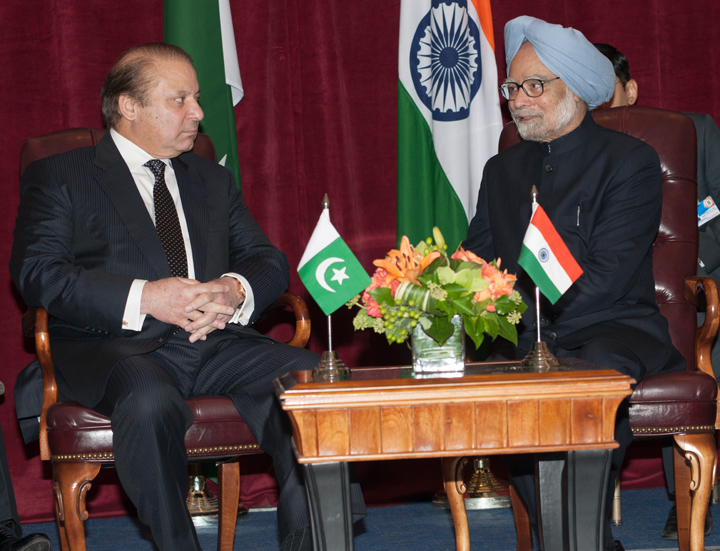
Voices this Week draws together published material on an important strategic issue in South Asia. In light of this week’s rare bilateral meeting between Prime Ministers Narendra Modi Nawaz Sharif, we offer analysis and commentary on the meeting and prospects for India–Pakistan rapprochement?
On the meeting, an editorial in Dawn opines:
“As ever, there are tough questions to be asked about the intentions and/or capacity of both sides to deliver on their rhetoric of peace. Is Mr Modi really interested in moving forward on normalisation of ties with Pakistan? A couple of days into his prime ministership that is impossible to know. The generous explanation would cast Mr Modi’s invitation to Mr Sharif as a signal that the new Indian government wants to work on improving ties with Pakistan immediately and perhaps even meaningfully. The less charitable explanation would be that Mr Modi has cleverly bought himself goodwill internationally by hosting Mr Sharif, but did so in a way that really conceded nothing: the invitation itself was one to Saarc leaders and the selective leaks to the media after the prime ministerial meeting yesterday suggested that Mr Modi stuck to a hawkish script instead of a more peaceable one. With Mr Modi having run a campaign that focused almost entirely on domestic issues, there is little yet to go by on what a Modi-led BJP foreign policy will look like over the next five years. South Asians may be eternally hopeful, but peace between states that have been historical rivals needs something more.”
Husain Haqqani describes “an old story of new beginnings,” cataloging historic efforts at India-Pakistan rapprochement:
“Nawaz Sharif’s participation in Narendra Modi’s inauguration may be the first time a Pakistani prime minister has attended such celebrations in India, but it is just one of many occasions that have been billed as an opportunity for laying the foundations of a new relationship between India and Pakistan.”
The Times of India also offers a limited history of “Cross-border Handshakes.”
Happymon Jacob highlights the importance of crisis management in India-Pakistan relations moving forward, arguing that the real test of a new government would be a crisis with Pakistan. While offering the outgoing government credit for managing to keep relations with Islamabad “under boiling point,” he describes the United Progressive Alliance’s (UPA) Pakistan policy as “a set of missed opportunities, strategic indecisions and its characteristic inability to walk the talk on crucial national security issues.” He concludes:
“Will a Bharatiya Janata Party (BJP)-led government in New Delhi behave differently with Pakistan? While the new government’s peacetime posture toward Islamabad may generally remain the same as that of the UPA, the real test of a government’s character in New Delhi will only take place during a crisis with Pakistan. First of all, the BJP’s articulations on Pakistan have been hawkish while in Opposition. Second, as we have seen in the past, media pressure on the government to act “decisively” during a crisis could be immense…. Therefore, in order to avoid getting caught in a commitment trap of its own creation, the Modi government will have to create the necessary crisis management structures jointly with Islamabad to begin with.”
Bloggers here at South Asian Voices also offered their take on the future of India-Pakistan relations and prospects for rapprochement:
Tridivesh Singh Maini: “Be positive, but realistic”
Sannia Abdullah: “Nawaz-Narendra Meeting: Giving Peace a Chance”
Reshmi Kazi: “Narendra Modi’s invitation to Nawaz Sharif”
Amina Afzal: “Of injuries and insults & India-Pakistan Relations”
Arun Vishwanathan: “India-Pakistan Relations: Two Questions on the Way Forward, Part I”
***